
Program:
W.A. Mozart: Eine Kleine Nacht Musik
F.Schubert: Ave Maria
N. Budashkin: Concerto Grosso in G Minor
K. Molchanov: Waltz
Monti: Chardash
I. Ponomarenko: Oginsky's Polonaise
I. Ponomarenko: Funeral March
M.I. Glinka: Noctorne "Separation"
I. Ponomarenko: Flea Waltz
Total Time: 43 minutes
released: 1994
label: Realworld Records, a WOMAD Production
Produced by Caroline Records Inc.
114 West 26th Street
New York, NY 10001
Review by Henry Doktorski:
The Russian word terem has many connotations, all of them good. "It's original meaning was the highest place in a house, under the roof, which is where girl virgins lived before they were married," explained Mischa Dziudze, the quartet's bass balalaika player. "Now, it can mean any beautiful building in the Russian style, or a beautiful place where many different animals live happily together, as in Russian fairytales. It can even mean beautiful dreams."The group got is first big break on a local St. Petersburg TV show, "You Have Five Minutes." "Very democratic program," said Andrei Smirnov, the group's bayanist. "You write to them and tell them what you want to do. If you pass their audition, you have five minutes on the air to do whatever you do."
And what the Terem Quartet does, they do superbly! I've heard many recordings of Mozart's Eine kleine Nachtmusik by various quartets, but none like this: exciting, fresh, exhilarating, and downright funny! The Terem Quartet does a bang-up job on this track; sometimes they play the notes just as the composer wrote them, and sometimes they don't, but the result is something that, I believe, Mozart himself (who had a good sense of humor) would enjoy. The domras remind me something of mandolins -- an instrument with which Mozart was undoubtedly familiar. The ending stretto is a blast!
Ave Maria exhibits the quartet's serious side; even the minor-second tone clusters in the accordion underscore the gravity of the piece. Budashkin's Concerto Grosso begins with a dramatic (dare I say "melodramatic?") introduction which leads into a theme reminiscent of Russian folk music. The middle section has an unmistakable jazz/new age flavor, which, I assume, has been added by the quartet.
Monti's Chardash, a work familiar to most concert accordionists, is performed with drama and flair and originality. Clever harmonic twists and unexpected tempo changes spiked my interest. Truly a group to watch for!
| About The Free-Reed Review |
| Invitation to Contributors / Submission Guidelines |
| Back to The Free-Reed Review Contents
Page |
| Back
to The Classical Free-Reed, Inc. Home Page |